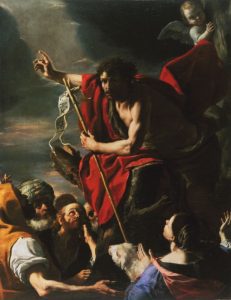Fr Neil’s homily at Mass on the Second Sunday of Advent (6 December)
Make straight in the desert a highway for our God.
John the Baptist appears out of the wilderness, clothed in camel hair and rumoured to live on locusts and wild honey.
The desert is a powerful symbol: it is where the Lord will go once John the Baptist has revealed him to the world. The desert is the place of divine encounter and trial. It’s the mountain wilderness where covenants are made and renewed.
A prophetic appearance from the desert cannot but invoke in the minds of the people of God the exodus from slavery in Egypt and their desert wanderings before entering into the promised land.
This evocative image embodied in John’s appearance was enhanced by his ministering a baptism of repentance in the river Jordan. There were plenty of ritual baths used by the Jews in Jerusalem but the Jordan is significant in that the first exodus ended once the people of God crossed the Jordan. John stands on the banks of the Jordan calling the people of God to prepare for the day of the Lord and the appearing of the long promised messiah. The message of John is clear, this messiah will lead the people into a second exodus.
It is no wonder that all the people of Judea and Jerusalem were going out to John at the Jordan. John’s ministry marks him as the last in a great line of Old Testament prophets as he himself fulfils the words of Isaiah: a voice cries in the wilderness: “prepare the way of the Lord, make straight in the desert a highway for our God.”
His proclamation is the beginning of the gospel or good news of our Lord. John sets the scene and prepares the people for the ‘Lamb of God, who will take away the sins of the world.’ Our Lord will lead a people into a new exodus, not from a merely physical enslavement but a spiritual captivity to sin and death.
This new exodus requires a baptism through water and fire of the Holy Spirit to be regenerate as the renewed people of God, the Body of Christ, the Church. Here we are called into a new covenantal promise as we in turn are being prepared for our entry into the heavenly homeland, a place spiritually flowing with milk and honey. It is the fulfilment of our true hears desire — finally to be freed from temptation and sin and be embraced by our Heavenly Father. Christ, as promised in Isaiah, ‘will feed his flock like a shepherd, he will gather the lambs in his arms, he will carry them in his bosom.’
This time of waiting and longing for the fulfilment of our journey into the fullness of our heavenly home can so often be marked by trials and tribulations that make us cry out, ‘how long, Lord?’
These times of trial and struggle — be it the madness of this COVID ‘pandemic’, which has seen greater losses of our physical and spiritual freedoms, or more personal and relational trials — test us often to the limits. Yet our preparations to celebrate the nativity with a sense of overwhelming thanksgiving is a timely reminder to us that God fulfils his promises.
The Lord of life, the Word made flesh, was born to us to bring us salvation and a spiritual liberty of the soul that not even the threat of death could steal away — the testimony of the martyrs bears witness to this. It is also a promise that we can trust that he will come again in glory to reveal a new heaven and earth where there will be no more tears or mourning or sadness. This promise has been sealed within us by the presence of God through the Holy Spirit.
The call then is to make straight his paths, through what is often the barren wilderness of our hearts. It is a call to prepare with thanksgiving, works of charity, generosity and love and a willing heart to come before our Lord acknowledging our sins in an act of penitence.
The promise is profound and the Eucharist is a foretaste, our manna along the way, in a spirit of faith, hope, and love for the fullness of heavenly joy.
The editorial title to this article is a line from “On Jordan’s bank the Baptist’s cry” by Charles Coffin, tr John Chandler.








 Posts
Posts